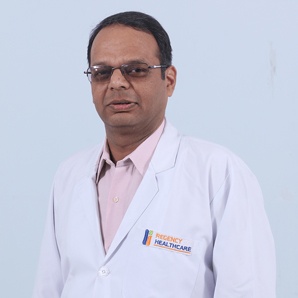Ophthalmology
Our Top Ranked Team Of Experts
Dr. Mohit Khattri
Dr. Sangeeta Shukla
Dr. Nirati Srivastava
Dr. Ashish Agarwal
Numbers of Excellence
Committed Staff
Trusted Patients
Years of experience
Beds
Super Specialists
Patient Testimonials
Frequently Asked Questions

- What is Ophthalmology and who is an Ophthalmologist?
- When should I see an Ophthalmologist?
- What are the signs of poor vision in a child?
- Are there any lifestyle changes I can make to prevent or reduce my risk of eye disease?
- How often and when should I get my eyes checked?
Ophthalmology is the branch of medicine that deals with the anatomy, physiology, and diseases of the eye, and an ophthalmologist is a physician who specializes in the medical and surgical care of the eyes and visual system and in the prevention of eye disease and injury. Ophthalmologists manage those with acute and long-term eye disease and treat patients of all ages.
You should book an appointment to get a comprehensive ophthalmology check-up if you have:
- Frequent headaches
- Eye infection/ Trauma
- Eye pain / Strain
- Blurred vision / Need of Lenses
- Difficulty in distinguishing colors
- Family history of eye diseases
- Diabetes / Hypertension
- Visual field loss
- Double vision
- Abnormal eye movements
Here are some signs to watch out for that may indicate your child has a vision problem:
- Squinting
- Clumsiness or poor hand-eye coordination
- Rubbing the eyes
- Headaches
- Itching, burning, or heavy discharge in the eyes
- Swollen, red eyes
If your child is experiencing any of the above signs, visit your nearest Ophthalmologist.
Beyond getting your eyes checked regularly, there are simple ways to maintain your eye health:
- Eating a healthy balanced diet
- Exercise regularly need oxygen to stay healthy and comfortable
- Get a good night’s sleep
- Quit smoking
- Protect your eyes against the damaging effects of UV light
- Drink plenty of water
- Have regular eye examinations
Routine comprehensive eye exams are one of the best ways to prevent eye conditions from causing permanent damage. With regular exams, your ophthalmologist can detect potentially harmful eye conditions even if you don’t have any symptoms. Diagnosing eye diseases early can ensure you receive the care you need before any irreversible vision loss occurs. If you are below the age of 40, visit the nearest Ophthalmology Clinic at least once in 2-3 years. If you are between the ages of 40-65, visit an Ophthalmology Clinic once every 1-2 years. If you above the age of 65, then you should definitely visit an Ophthalmology Clinic once a year.
Book Your Visit

 Call-an-Ambulance
Call-an-Ambulance







